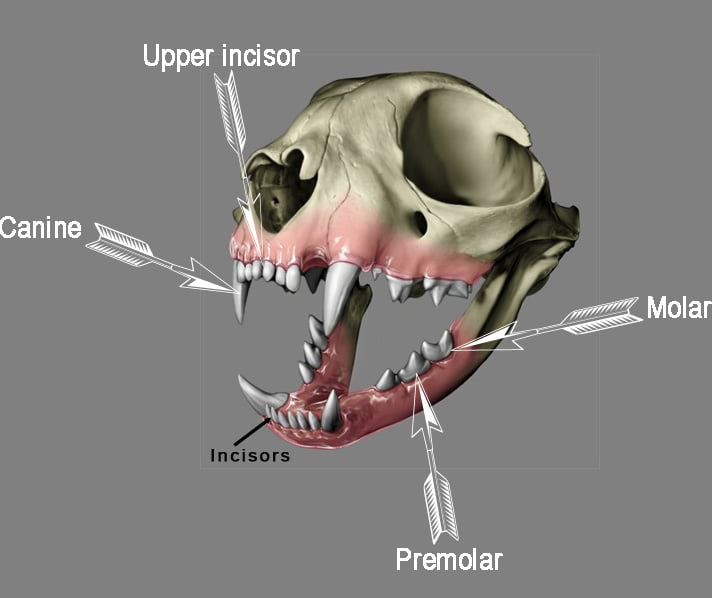 |
| Image showing the teeth of a cat including the canines. Image: PoC. |
How many teeth do cats have? The answer is 30. For humans it is 32 (this is for adults in both cases).
If it is dark, domestic cats use their whiskers to feel for this position. You can see them instinctively push their whiskers forward when they are interested in an object placed before them. You might see this in play, for example. Whiskers are incredibly sensitive because there is a huge conglomeration of nerve endings at the base of each whisker which allows them to almost feel something and measure the shape of that object. They can feel the minute air currents passing around buildings and objects which allows a cat to "see" during the night together with their night vision based upon a reflective layer behind the retina.
Breaking the spine is one way that a domestic cat kills prey but there are others. For example, I have seen my cat kill a pigeon by suffocating it. This is the method used by the big cats to kill large prey animals. It was very interesting although sad to see him kill a pigeon in the same way. The canine teeth would have been part of that process as they would have pierced the neck of the pigeon.
CLICK THIS LINK TO SEE A RANGE OF ARTICLES ON CAT TEETH
It is the canine teeth, their fangs, which hurt us when a domestic cat bites either their human companion or somebody else. They are not particularly sharp but sharp enough to create a deep puncture wound in a person's leg because the cat's jaw is very strong. In this way they can "inject" mouth bacteria under the skin which is why people have to be cautious after being bitten by a cat. Not every bite leads to an infection but some do and you can check this out by clicking on this link if you wish.
A domestic cat's incisor teeth are very small and rather insignificant but they are there to help groom themselves. You can see this when they nibble their fur with their incisor teeth. And of course, they help when they're eating by tearing off flesh and then passing it back to the carnassial teeth which have a shearing action a bit like scissors as opposed to the grinding action of human molar teeth.
It is the canine teeth, their fangs, which hurt us when a domestic cat bites either their human companion or somebody else. They are not particularly sharp but sharp enough to create a deep puncture wound in a person's leg because the cat's jaw is very strong. In this way they can "inject" mouth bacteria under the skin which is why people have to be cautious after being bitten by a cat. Not every bite leads to an infection but some do and you can check this out by clicking on this link if you wish.
A domestic cat's incisor teeth are very small and rather insignificant but they are there to help groom themselves. You can see this when they nibble their fur with their incisor teeth. And of course, they help when they're eating by tearing off flesh and then passing it back to the carnassial teeth which have a shearing action a bit like scissors as opposed to the grinding action of human molar teeth.

No comments:
Post a Comment
Your comments are always welcome.
Note: only a member of this blog may post a comment.